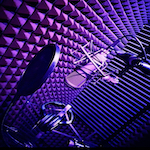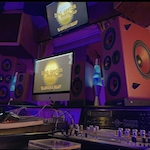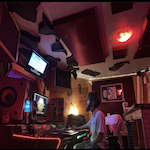As a first-time music artist, stepping into a professional recording studio is a different feeling. I think most of you would agree to this, the first time is a special one, you get an exciting experience.
If you are a musician looking forward to recording their first ever song in a music recording studio in Atlanta then this page is just for you. Recording music can be a tough task especially when you are a beginner in this field.
So, it is better to break down the things that you will need to take care of that are involved in music production. In order to make it approachable, and enjoyable for you.
But what are these things that you should be aware of before you start messing with your music production?
Here you go!
A recording studio consists of two parts, one where the music engineer works die-hardly. And second where the performer performs his share of work. Usually, the performer comes into the engineer’s space to record his voice as best as possible.
This blog is nothing but a clear description of what to do and what to avoid. Before you even enter a recording studio to record your first project.
So, now the introduction part is over let’s move on to the main part of the blog- THE REAL PART.
1. Prepare your material in advance:
I hope it is quite clear from the heading that you should, or must prepare your material in advance. This not only saves the recording time you would spend without preparation. But also saves a lot of money that you will likely pay for your recording session.
Doesn’t matter whether you are working on music, a podcast for your YouTube channel, a voice-over for advertisement, or any other audio project. Just make sure that you are fully prepared, and have finalized and properly rehearsed material before you enter the recording studio.
If you are a musician, make sure you have practiced your instruments and vocals. And if you are to record a podcast, make sure your script is well-structured and practiced.
Remember- you are visiting a recording studio to record your piece, not to waste time on taking retakes. As retakes will only increase your expense, and waste your recording time.
The better prepared you are, the more efficient your session will be.
( Read More- What to Look for in Recording Studios in Atlanta: 7 Key Considerations )
2. Understand the studio equipment:
Well, you don’t have to be an expert and know everything about the various equipment used in a recording studio. All you need is a basic understanding of those instruments, and what and when they are used during the recording stage.
You need to be familiar with the microphones, audio interfaces, digital audio workstations (DAWs), mixing consoles, and all the commonly used equipment. A basic understanding of these equipment will help you understand your music recording process in a simple, and better way.
It would be even better if you could extract some time from your schedule and attend some workshops, or watch tutorials. In order to gain a better understanding of the equipment, and technology used in studios. Don’t worry, we got you, the Best Recording Studios in Atlanta is here to help you out. Doesn’t matter if you have queries.
3. Choose the right studio:

The main blunder that most of us fall into is not choosing the right studio. Not all studios you visit provide the same results, that is why you would have noticed they all have different rates for each recording session.
Some studios might have better equipment, acoustics, and mixing consoles than others. So, it is best to review these factors before you book your session with a random one and regret it later.
Everything is important, the location of the recording studio, the environment, and the experience of the sound engineer who will be helping you. Check for the reviews, and legit testimonials from their customers, and clients, and make sure the studio is fit for your recording project.
4. Work with a skilled sound engineer:
A sound engineer is one of the most important factors for recording your first recording project. The sound engineer is the person who can make or even break your whole recording, so it is quite essential that you have employed a skilled one.
So, take your time, and understand how he works, and his expertise, based on his past work. If you’re bringing your own engineer, ensure they are familiar with the studio’s equipment.
An expert in the field is important as his expertise is what makes your recording sound brilliant and professional. His work is to enhance the sound quality, correct mistakes, and make the whole session more productive and enjoyable at the same time.
5. Bring the right equipment and accessories:
The thing is- you won’t get all the equipment in the recording studio, and if you were you won’t get it all as per your preference, and tuned. While most of the recording studios might offer you the necessary equipment, it is better to carry your own especially when you prefer to work with specific ones.
If you’re a musician, you should bring your own instruments, guitar picks, drumsticks, or any other gear you might need during your recording session. However, if you are a vocalist, you should bring your own headphones and pop filters ( if you have a preferred brand) with you.
And yes, don’t forget to check what amenities the recording studio provides you with, and what you will need to bring with you.
Having backup always pays off, preventing last-minute issues that could hinder your recording session.
6. Warm up before recording:

Warm-up is a kind of revision of whatever you have practiced, or learned. Just like how athletes warm up before their match, as a musician, you should warm up before they start recording their audio.
Warming up is an important step to ensure that vocals are at peak, equipment is properly tuned, and microphones, and headphones, are working properly. As a result, it prevents strain and ensures the best possible performance.
If you want a perfect recording, you need perfection, and perfection comes with practice. The more you practice, the brighter you shine, even in the dark. A proper warm-up has its own benefits- it helps boost confidence, reduces nervousness, and increases your efficiency during the recording.
7. Manage your time wisely:
You must have heard that “Time is crucial”, but time is also expensive, especially when you are recording your first audio. Recording studio time is expensive, every minute counts, and if you have not planned or practiced enough, every minute is a waste.
So, the first thing you can do is practice a lot so you don’t have to take retakes in the studio. Also, arrive on time and plan your entire recording session in advance. Have a clear understanding of what you want, what your goal is, and how you’re going to achieve it.
If you’re recording multiple tracks, prioritize the most important ones first. Following an efficient time management plan will help you make the most of your session. It would be better to create a session schedule with estimated time slots for each task that can help ensure that everything runs smoothly.
( Read More – Advanced Recording Techniques For Music Artists )
8. Be open to feedback and adjustments:
Recording studio is a professional place, a palace occupied and used by professionals, and experts in the field. As a first timer you will be prone to making mistakes, don’t worry, everyone faces that stage. Be open to receiving feedback from the sound engineer or producer of the recording studio.
9. Take care of your voice and instruments:
As an artist the major tools you have are your vocals, and your instruments, so treat them with immense care. If you’re a singer, stay hydrated, avoid dairy products, and don’t strain your voice before the session.
A little shift in your voice can hamper your recording to a great extent. Make sure your musical instruments are in top condition. Your guitar should be properly tuned, drumheads should be checked, and any electronic gear should be working properly.
10. Understanding post-production and mixing:
Post-production plays a crucial role in the final product. It involves mixing and mastering, and editing, which refine the sound and enhance quality. Before starting, discuss the process, expected revision time, file formats, session backups, and licensing with the engineer.
This helps you plan the release schedule and ensures you have everything needed for distribution.
Conclusion:
Recording music can turn out to be a tough task especially when you are a beginner in this field. And looking for a proper recording studio to compose your music.
Just remember to be organized, have a plan, take your time, and follow the guide mentioned in this blog.
Make sure your studio has everything mentioned in the above 6 points.
In this blog, we discussed the 6 points that you need to have in your studio.If you are someone who’s facing difficulties in finding the best Atlanta recording studio.

